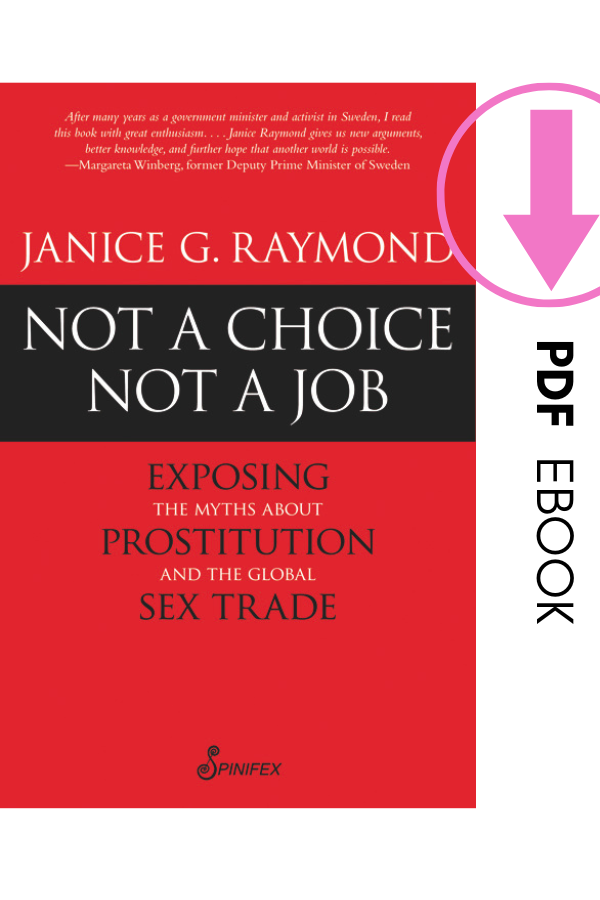Reviews
After many years as a government minister and activist in Sweden, I read this book with great enthusiasm. . . . Janice Raymond gives us new arguments, better knowledge, and further hope that another world is possible.
Margareta Winberg, former deputy prime minister, Sweden
Janice Raymond has uncovered, analyzed, and exposed one of the biggest legislative scandals since the slave trade—that of state-sanctioned prostitution. Her research is impeccable, and her conclusion—that the international sex trade be seen as a human rights atrocity—should be taken on board by every politician, policy maker and law enforcer around the world.”
Julie Bindel, journalist, author, and social commentator for the 'Guardian' and other publications
Janice Raymond has written a thoroughly documented book on combating prostitution in all its forms. I have no doubt that the book will greatly benefit not only governmental authorities and human rights activists but also academics and researchers in understanding the complexity of this ‘crime against humanity’ and methods to eradicate it.
Sigma Huda, former UN Special Rapporteur on Trafficking in Persons, especially Women and Children; Secretary General, Bangladesh Society for the Enforcement of Human Rights
This is an extraordinary work that will serve for years as the go-to book on the relationship between sex slavery and prostitution. Janice Raymond, who has spent decades wrestling with the prostitution challenge, has covered every nook and cranny of this issue: the history, the efficacy of present practices and, where we should go from here.
John Miller, former U.S. Ambassador-at-Large of Modern Day Slavery; former member of the U.S. House of Representatives (R-WA); and former director of the U.S. State Department’s Office to Monitor and Combat Trafficking in Persons from 2002–2006
Not a Choice, Not a Job is a timely and needed book for those who are looking to dispel the smoke and mirrors and uncover the horrific and complex truths of prostitution and the global sex trade. Janice Raymond’s years of experience in leadership, education, and advocacy are undeniably found within this book. This is a must read for those who want to understand the facts about the harsh realities that so many experience.
Vednita Carter, founder and director of Breaking Free, a survivor-led service for victims of sexual exploitation
To talk about prostitution and understand the global phenomenon of sexual exploitation, there is no better starting point than Not a Choice, Not a Job.
Clare Nolan, National Catholic Reporter
Not a Choice, Not a Job has successfully turned what has become largely a 'debate of words' into a conversation accountable to the lived experiences of women.
Ane Mathieson, Journal of Interdisciplinary Feminist Thought
The overall strength of this book is its presentation of the feminist abolitionism perspective and application to the analysis of the problems of prostitution and human trafficking. This analysis and the policy proposals stemming from this analysis differ from those of other authors and some organizations in the field...In conclusion, this reviewer recommends this book to academics, policy makers, and lay persons concerned with the issues of prostitution and human trafficking.
Barbara Ann Stolz, Criminal Law and Criminal Justice Books
Podcast of interview with Janice Raymond
Meghan Murphy, Feminist Current
Raymond expands the boundaries of scholarship in women’s studies, making this book indispensable to human rights advocates around the world.
Stop Trafficking! Anti-Human Trafficking Newsletter
Table of Contents
Preface
Acknowledgments
Introduction
1 Myths and Mythmakers of Prostitution
2 Prostitution on Demand: The Prostitution Users
3 Prostitution Nation: The State of Prostitution in the Netherlands
4 Economic Development or Economic Opportunism? Trafficking, Migration, and the Military-Prostitution Complex
5 Good Practices for the Future
Notes
Index
About the Author





